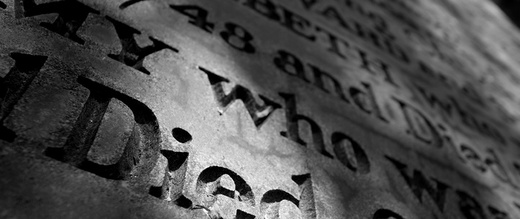The views expressed in our content reflect individual perspectives and do not represent the official views of the Baha'i Faith.
I was sorry to have my name mentioned as one of the great authors, because they have a sad habit of dying off. Chaucer is dead, Spencer is dead, so is Milton, so is Shakespeare, and I’m not feeling so well myself. – Mark Twain
Because I studied American literature for a very long time, I learned to appreciate the work of that great American author and humorist Mark Twain. In the town where my wife and I live, we have a 19th Century theatre where Twain twice gave readings from his books. In fact, we went there last night to see a new climate change documentary, and the projectionist had a little trouble getting the film started. That delay meant that we sat there for a while—which gave me some time to contemplate the boards of the theatre’s original stage from the balcony, and imagine Mark Twain standing there.
He spoke on that stage in 1865 and again in 1867, some two decades before the publication of his great novel The Adventures of Huckleberry Finn. Even then, audiences loved him, mostly because his genuine wit and insight made them laugh. He talked about his travels, his work as a journalist, his encounters with people, and he made each one of his stories uproariously funny. He did it by irreverently poking fun at convention, at pomposity, at artifice—and even at death:
We never become really and genuinely our entire and honest selves until we are dead — and not then until we have been dead years and years. People ought to start dead and then they would be honest so much earlier.
We owe a deep debt of gratitude to Adam, the first great benefactor of the human race: he brought death into the world.
Let us endeavor to live that when we come to die even the undertaker will be sorry.
In fact, we probably remember Mark Twain best for his wry, welcoming attitude toward mortality, which he faced with courage and humor. He said the world would be a dreadful place if we were to continue to live forever. Here’s maybe the most famous death quote ever from this eminently quotable man:
James Ross Clemens, a cousin of mine, was seriously ill two or three weeks ago in London, but is well now. The report of my illness grew out of his illness; the report of my death was an exaggeration.

Mark Twain
Twain, toward the end of his life, developed a real curiosity about death. He loved studying obituaries, and learning from them. He told one friend that his morning ritual involved reading the newspaper in bed, carefully scanning the obituary section, and then—if he wasn’t in it—getting up.
Lately I’ve adopted Twain’s habit myself—I now read obituaries carefully. (I get up first, though) As you age, you know more people who have met their fate, so your interest rises in those short summaries that can say so much in so little space. It might seem morbid to some, but obituaries fascinate me, because they try to capsulize an entire life, and because they can teach you a great deal in so few words. Obits, as they’re called in journalism, typically contain the facts: date and place of birth and death, family, profession, accomplishments, religion. Because of that reduction of a person’s entire life to a few salient details, obituaries can answer this important question: You might think of yourself as a spiritual person—but do others?
Ponder it for a while. If you died tomorrow—perish the thought—what qualities and virtues would your eulogy or your obituary mention? Would it say that you were a good parent, a good son or daughter, a lively and loving person? Would your obituary even mention your spirituality? Maybe not, if you’ve kept it private. Obits hardly ever delve into a person’s spirituality, unless they’re reflected in faithful membership in a particular religion, or in the person’s real, spiritually-driven actions in the world.
That’s my point here: we tend to think of spirituality as the way a person’s inner reality perceives the numinous and the mystical—but true spirituality transcends the inner reality, and becomes an outer one. Our spirituality isn’t just a mental construct or a thought process or a conceptual philosophy. Our spirituality, if it’s real, has real-world applications. It makes itself known as actions. You can touch it and feel it. The Baha’i teachings say that spirituality is what you do, not just what you think or feel:
Know, O thou possessors of insight, that true spirituality is like unto a lake of clear water which reflects the divine. Of such was the spirituality of Jesus Christ. There is another kind which is like a mirage, seeming to be spiritual when it is not. That which is truly spiritual must light the path to God, and must result in deeds. We cannot believe the call to be spiritual when there is no result. Spirit is reality, and when the spirit in each of us seeks to join itself with the Great Reality, it must in turn give life. – Abdu’l-Baha, Abdu’l-Baha in London, p. 107.
This one sentence: “That which is truly spiritual must light the path to God, and must result in deeds,” truly summarizes the Baha’i message about the soul.
In our contemporary culture, we often view spirituality as a solely inward quality, a private, hidden body of opinions and conceptions we don’t often share with others. But the Baha’i teachings—and Mark Twain—question that big assumption, and challenge us to make our spirituality actual rather than virtual:
Action speaks louder than words but not nearly as often. – Mark Twain
Beware… lest ye walk in the ways of them whose words differ from their deeds. Strive that ye may be enabled to manifest to the peoples of the earth the signs of God, and to mirror forth His commandments. Let your acts be a guide unto all mankind, for the professions of most men, be they high or low, differ from their conduct. It is through your deeds that ye can distinguish yourselves from others. Through them the brightness of your light can be shed upon the whole earth. – Baha’u’llah, Gleanings from the Writings of Baha’u’llah, p. 305.
Let’s look, then, in the second section of this continuing series, at the Baha’i concept of a lived spirituality, a deeds-centered spiritual life, and see what spiritual qualities and actions it calls for.
Next: Living the New Spirituality: If You Could See the New Jerusalem

















Comments
Sign in or create an account
Continue with Facebookor